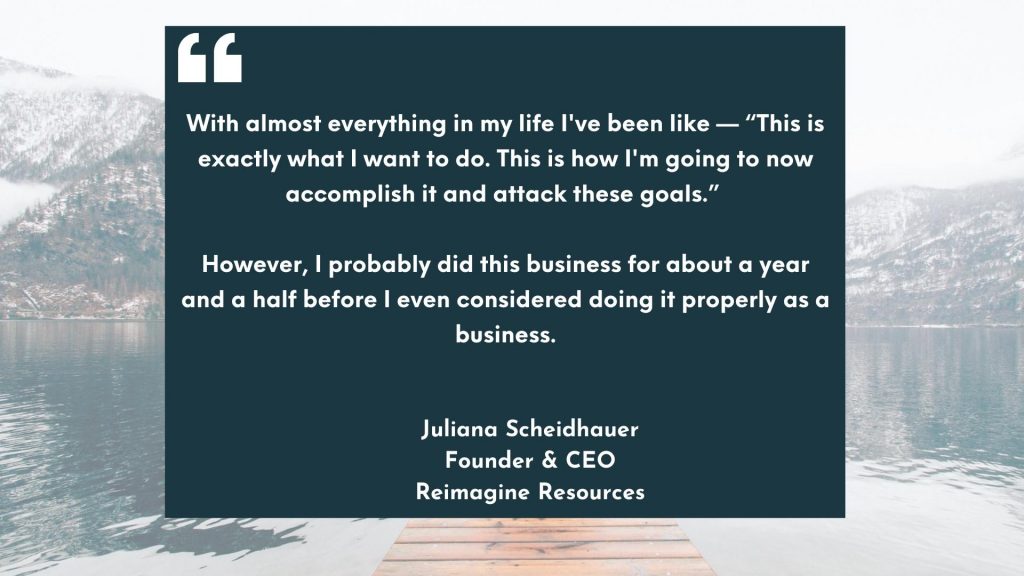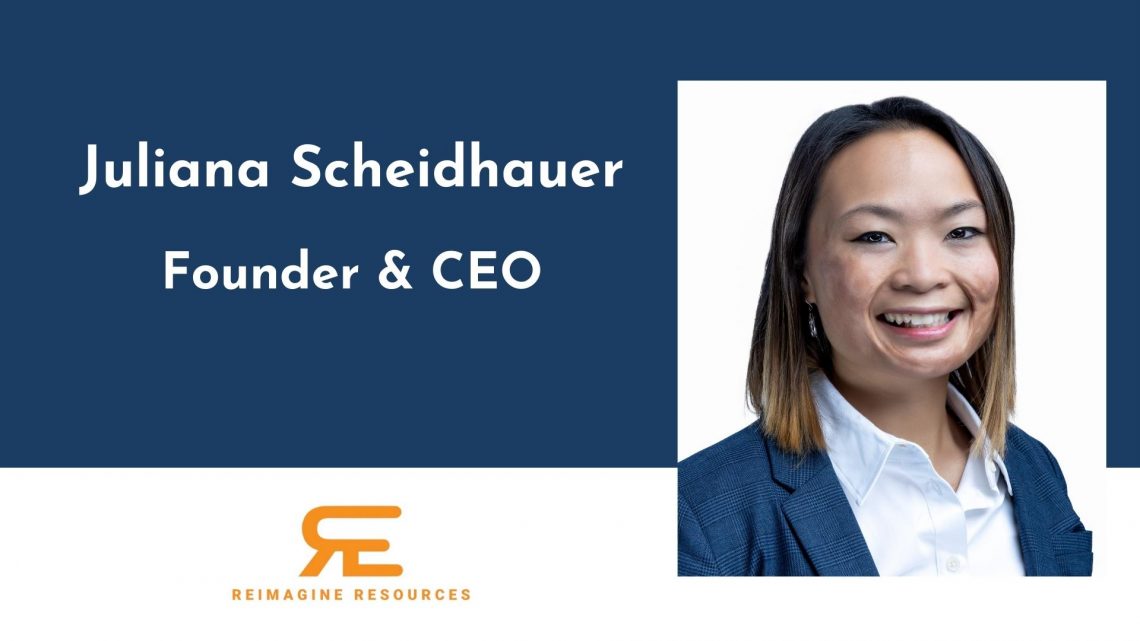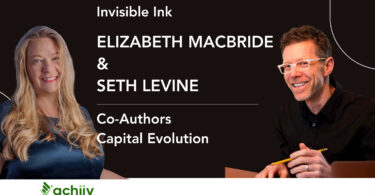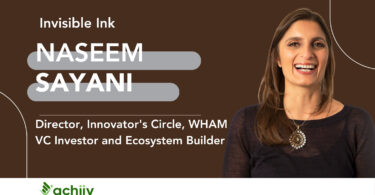About
Summary
What do you do when your dream career slips out of grasp? And a global pandemic hits just as you’re trying to change course? How do you take a boring, male-dominated business by the horns as a young, untested entrepreneur through guts, discipline and tenacity? How do you stay true to your inner calling while still being financially viable?
In this episode, entrepreneur Juliana Scheidhauer talks about finishing college at 18, her love of the Marine Corps, bootstrapping a business from her parents’ garage, and more.
Episode highlights
- How to turn adversity into entrepreneurial advantage
- How to follow the market to find your idea
- How to be your own advocate when facing off with the Big Guys
- When to “grow up” and get real about business finances
- How to use cash to set the right pace of growth for your business
- Why business is a vehicle for social impact
- How to price with street smarts and intuition
- How to pick your battles as an under-represented woman entrepreneur
- How to pick the right risks to take as an entrepreneur
- How to stay true to your purpose and still do well
Links & Resources
Reimagine Resources – The company that Juliana founded

Interview transcript:
Shubha Chakravarthy: Hi, Juliana. It’s great to talk to you today. Thanks for being on the show!
Juliana Scheidhauer: Thanks for having me. I’m super excited to dive into this with you.
Shubha Chakravarthy: Tell us a little bit more about you and your background.
Juliana Scheidhauer: I am here in St. Louis, Missouri. I grew up here, spent most of my life here and I was homeschooled from around sixth grade to all the way through high school. From there I went to college and did that remotely. I finished high school around 16 and college around 18. I also worked at a nonprofit when I was 16. I worked there as an intern and then worked my way up to the acting admin director for the small nonprofit.
Shubha Chakravarthy: So, you finished college right around the time kids are thinking about applying. What happened next? I know that you enlisted in the Marine Corps. That’s pretty unusual. Can you talk about what drove you to that decision?
Juliana Scheidhauer: Yes, so I wanted to go into the Marine Corps and become an officer. I went the OCS route — Office Candidate Route. My plan was that I would go into the FBI and as they wouldn’t take people until they were 23, I had a couple of years in between and I knew that going into the military would help the selection process and getting into the FBI. I ultimately decided not to go the FBI route, but I still wanted to do the Marines.
During my time at the OCS officer candidate school I got medically discharged and I came back just to try and figure out what I wanted to do next. As I was trying to get better from what happened at OCS, I wanted to do martial arts, maybe start another business, and then COVID happened. That put things in a different environment for me.
I was previously looking at getting a physical location for my other business. I decided I didn’t want to do that because of everything with COVID. I still wanted to work out and to get more fit and healthy again. I decided to get some workout equipment and then I saw that it was a good market and it was really hot at the time and I kind of just started from there.
Shubha Chakravarthy: So, when you went in did you have specific goals for how big the business is going to get or what you wanted to do with it?
Juliana Scheidhauer: Absolutely not. With almost everything in my life I’ve been like — “This is exactly what I want to do. This is how I’m going to now accomplish it and attack these goals.” However, I probably did this business for about a year and a half before I even considered doing it properly as a business.
The business that Reimagined Resources deals with is selling and servicing workout equipment. We also do parts and we are building a lifestyle brand of other resources that are connected with it. But at the start it was just about selling workout equipment. I didn’t think that was very viable or a great business plan.
That’s not what I imagined myself doing. If I was going to start a business, it was going to be more sexy than picking up workout equipment and then reselling it. But I seem to do pretty well in that space. It’s really fun to just go through all the different workout equipment, and sourcing that and selling that and learning more about the different types of pieces and how they all work.
Shubha Chakravarthy: So was it just a side hustle when you started and you were just trying to make some extra money on the side?
Juliana Scheidhauer: Yeah, it was definitely a side hustle. But I knew that it couldn’t stay a side hustle because I was making too much money with it. The sales — not the profit, were over $150,000 in the first year.
There was one particular moment when the Neighborhood Association came to my parents’ house because we started out in my apartments and then we went into my parent’s garage and we took up their garage, their back porch, part of their basement, and part of the area inside. Then I expanded to my grandma’s garage — a part of her garage and her back porch.
So, the Neighborhood Association came to us and said, “You have got to shut down your operations.” And I was like, “I’m going to school. I can’t do that right now.”
So, at that point I realized that I either needed to make it a business or I needed to stop doing it or at least get insurance to cover myself because at that point I wasn’t an official LLC. So, I was very exposed at that point.
I know as entrepreneurs and business people it is not recommended to do that and at that point I decided that I needed to make it a business. I looked for a place and tried to find out how we were going to expand, what our strategy was, and all that kind of stuff.
I was definitely very concerned the first day. I went ahead and reached out to a couple of people. I did my research and I think that is always something that someone should do. I found out the Neighborhood Association and the board were actually business owners and the pretense which they brought against me was that you couldn’t have any kind of business out of your house. You can work from home, you can have business assets on your property, which was completely unreasonable because it was during the pandemic and everybody was working from home.
Anyway, I found out that several of the board members were also business owners and ran it out of their own house. At that point it gave me a lot more confidence, assurance, and the understanding that they couldn’t really do anything to me until they went to the city. I was willing to fight it because the other board members were also business owners.
Shubha Chakravarthy: You talked a bit about the early days of your venture. You had the idea and you got revenue, what happens next? Did you start with a sales goal? What was your next milestone?
Juliana Scheidhauer: I can’t remember what came first. We got a truck, which was a big thing because beforehand we are using a van and that wasn’t the best.
We had to take everything apart but getting a truck allowed us to do a lot more. So, we began looking at our operations and tried to figure out how we can make it go more smoothly and what brings in more revenue and sales.
Ultimately, we started looking into spaces so that we can get out of the garage because we were limited in our infrastructure. I brought in some extra help and I started hiring my brother. Even from the beginning, I was having my family help. If someone was there to pick up an item — the porch pickup, I’d have my parents ask them that, put it out for me and collect the money. I would ask my brother and hire him to come help pick up equipment and take equipment apart and put them together.
It was a lot of work and I was working probably 80 plus hours and getting hundreds of messages a day. I would be out till midnight, one, or two in the morning. Sometimes I would just be picking up equipment or putting things together. It was a lot of work so we brought in more people as well.
I think that was a turning point as just by bringing in more people, we began trying to not just do the operations but run the business.
Shubha Chakravarthy: So, you are starting to talk about real commitments in terms of finance. Can you talk about funding? How did you think about it as you are generating cash by selling but then you are starting to employ people.
Juliana Scheidhauer: It was maybe a little more fun not having to think about the business part and also having more revenue that way when you didn’t have to invest. But ultimately you want to look at the long-term strategy and not just what makes you a quick buck now because there is a lot of risk in that and also there is limited room for growth.
So, ultimately what I decided was that I wanted to make this into something long-term and something that we can grow into. I’m willing to be more of a growth company rather than just a company that tries to make a profit.
I always wanted to be an entrepreneur. It doesn’t really matter what kind of industry it is in as long as it is making the world a better place and so, if I could find something within what I’m doing to make that mission possible then I can absolutely do that.
Shubha Chakravarthy: So, it sounds like you did actually have to worry about funding when you hired your employees. Where did you get the funding? Did you have savings? Did you borrow from friends? How did that whole thing work out?
Juliana Scheidhauer: At the very beginning, I had $500 left in my bank account. I still had debt from school, but with $500 left in my bank account I decided that I wanted to purchase some workout equipment thinking that I can at least make back what I put into it so I wasn’t going to lose any money.
Moreover, if you only have $500, you don’t have much further to go anyway. So, I figured I have a degree and at some point I can get a minimum wage job, drive to some parking lots, and I can work hard. At the beginning I started with $500 and when we went into upgrading and putting more into that capital investment of trucks and people — that was self-funded through the business because we were already operating, but then a lot of it also came from family members and myself.
Shubha Chakravarthy: Did you ever consider or have you considered outside funding and what do you think about that route?
Juliana Scheidhauer: Yes, I definitely considered outside funding for the company, but when we talked to banks and SBA loan officers it was difficult getting funding because we had to be in business for two years and be in the blacks — be profitable, which makes sense.
But at the same time, it’s difficult that as a startup — that you are already a profitable business with a viable business model that is working and you can’t get funding just to grow and have that infrastructure.
Shubha Chakravarthy: Have you managed to crack that conundrum?
Juliana Scheidhauer: I have not cracked that one yet. We’re about a year old now. So, because we’ve invested very heavily into the business, I’m not sure if we made profitability, we probably broke even the last year.
We are almost there to the next year so we can work on the second year. We have just basically been bootstrapping it for about a year. So, it is working and we have had people ask if they could invest in our company.
But for me, I want to make it a value driven company that prioritizes its mission. So, giving up that equity can be scary, but it isn’t that I have the need to control everything. I don’t need to retain full control. I don’t need to control as I am not my business, that’s separate.
But at the same time, the way that people are able to impact the world and change society is going to be through business and I believe that is the future of influence. You can do that through people and the government, or other things like that. Really at the end of the day, people need things and the best way you can do that is through funds, through people, and through your initiatives as a company and that is why I don’t give up equity.
Shubha Chakravarthy: Shifting gears slightly — you have to acquire customers to get revenue. How did you go about finding your first customers and has that changed over time as you’ve become bigger?
Juliana Scheidhauer: I was very fortunate this time around. I’ve tried to do other business things before. Some of them have been done really well and some of them have been more difficult to get customers. But I was really fortunate this time around that the customers just came to me. There were just hundreds of customers a day messaging me. I would sell something out sometimes within minutes of posting. Sometimes, I would sell things within a couple of days of posting the items on Facebook marketplace.
So, we did a lot of social media marketing. Now we have our own platform. We are on other places too, like other social media platforms. We are on Google. So, now we have a lot of different avenues and channels but at the beginning the first customers came through Facebook marketplace. Go where people are already at and don’t try and reinvent the wheel. If people are looking and searching for items in a particular place go there. That’s what we did.
Shubha Chakravarthy: Was there a way you figured out Facebook marketplace in terms of costs, in terms of reach, how did you do that calculus in your head?
Juliana Scheidhauer: Like the pricing or how much we put into it?
Shubha Chakravarthy: No, the cost of acquiring a customer.
Juliana Scheidhauer: So, it was very, very low to acquire a customer on Facebook because they’re already on social media. We did end up boosting some of our posts but for the most part we didn’t. We acquired followers and we got recommendations after that. We were making sure that we had our reviews and that they were really good.
There are always going to be people who are not happy with things or don’t understand the market because the market for workout equipment was inflated and you couldn’t find them anywhere and so sometimes people just didn’t understand the market or economics or you just came across people who are grumpy.
But for the most part, we made our customers happy and we showed that. We demonstrated that and we made things right if there was anything that we made a mistake with. So, it didn’t really cost us too much on social media. I guess now because Facebook changes algorithms with Apple’s new privacy updates, it has become more difficult but that is where as an entrepreneur and an innovator you have to figure out what to do next. Always be on top of that and so we have moved on to Google and we are working on other platforms now. We are trying to get onto YouTube and Tik-Tok, but all that takes time.
Shubha Chakravarthy: How did you think about pricing your equipment in the early stages when it was still a side hustle and has that approach changed over time?
Juliana Scheidhauer: The approach has changed a little bit since the beginning. Initially, it was trial and error. How much do you want to price it at? What is the price at which you can sell the item quickly, have a high turnover, but at the same time, you want to get the highest price?
So, it’s not going online and figuring out what the average is or whatever. The market is always changing and especially during the pandemic, things were changing on an hourly basis based on the news, based on the supply chain, and it was changing so rapidly that you couldn’t have data and analytics.
You have to almost have that intuition of “What should this price be based on historical data, based on the news coming out, and based on the environment that I’m in?” It is not based on the value of the item. It is based on other factors and so, it was a lot more emotionally driven as even consumers are very emotionally driven.
So, the pricing wasn’t based on the price of the item. A lot of the time the used equipment was even more expensive than it was five years ago. I guess having that intuition for pricing was really important. Now, it is even calculating a little bit more of , “Okay, so what is the price at the market?”
The question is also what the price is now because the market has cooled more now. What is the price of labor? What is the price of time, gas, and overhead. So, there is a lot more that goes into it now and our prices are generally a little bit higher than some on Facebook but we also have that guarantee and insurance that our products have been checked and we know what we are talking about and we are a business versus somebody who is selling something on Facebook who has no clue what it is and then you end up with a screwed machine.
Shubha Chakravarthy: Which leads us to the next question about financials and modeling. All of this calculation you talked about implies a certain amount of effort and analysis. How do you approach financial models? Did it change from the early days?
Juliana Scheidhauer: As someone with a business background, having an undergrad in finance and getting my master’s in international business, I know that it is very important to have a financial model and to have business plans. However, during this time I did not have that.
I would not recommend it.
Speed and intensity is very important, especially when there is a very volatile market and a very changing and uncertain world and that is what I prioritize over the data and analytics and making sure I have everything perfectly done. There are certain things that you need to have done, obviously, for example — your taxes and other things like that.
But for the most part, you don’t need to have everything analyzed if you are already doing really well. Figure out what the market needs, how you can do that and then go for that and then you can analyze it. If you start going down into your statistics, then you can get better infrastructure and then you can do all that analytics.
But at the beginning it is more important to keep at stride if you are already there.
Shubha Chakravarthy: You have an Asian heritage and it is hard enough for a woman entrepreneur to have any kind of business, but particularly in a male dominated business, like fitness equipment. Can you talk about what your experience has been through this process? What have been the challenges for you?
Juliana Scheidhauer: One advantage of being online is that it is sometimes easier to sell because they don’t really see who is selling. They just say, “Hey, this is equipment. This is what I’m buying.”
But in person it is a little bit more difficult. So, sometimes — not all the time, but sometimes I’ve had people come up to me and ask me if I know what I’m talking about and this equipment that I’m selling — that I’ve sold thousands of dollars of, if I know how it works. So, it is just something that I have to understand, that other people have a different perception.
I can stand out by doing my homework and by knowing what I’m talking about. In terms of working with other manufacturers within the business side of things it is a lot more difficult because if it is a smaller community and people know other people, then as a female, it is more challenging to get in there. I don’t think it’s impossible.
I think it’s important that you have male colleagues or male friends who can help promote you. But it is disappointing to see that it is more difficult but I guess it is a factor of life that females just have to overcome.
Shubha Chakravarthy: What do the male affiliates or associates help accomplish for you? How does that play out in real life?
Juliana Scheidhauer: So, in real life it can look like advocating for you. They can make introductions, they can give recommendations, which is huge for females because a lot of times they already have that perception of, “Do you even know what you are talking about? Why are you in this industry?”
So, that can be a lot more difficult if you don’t have someone advocating for you or recommending you because it is hard to get into those spaces. On a practical note, it is hard to negotiate prices when they won’t sit down at a table to talk to you.
Shubha Chakravarthy: And how do you get over that?
Juliana Scheidhauer: Being persistent. Not letting yourself get discouraged if one guy says no or if you have one bad experience. Just going after what you want and not letting that affect you too much because the world is a big place and I’m sure that you can get another place if you are motivated enough.
The world is changing. So, hopefully as women become more prominent in this space, it will be more open to other women.
Shubha Chakravarthy: It sounds like it was already hard enough, just with going to college and all of this stuff, and you have had to consistently face a lot of these barriers too. Has it ever gotten to a point where it just got to be too much or things seemed too hard and how have you gotten through those times?
Juliana Scheidhauer: There have been certain instances of discrimination — particularly in finding a place. I reached out to someone and it seemed like they had a problem with either with my age or gender. So, I don’t know what it was but I know that it was not a great experience.
But I ultimately found the place that I needed to be at and I was happy with that. I don’t think that being Asian has affected me but I also grew up in a very white community. I was adopted as well. I probably haven’t faced the same kind of discrimination or the same kind of upbringing by someone who is completely Asian.
So yeah, I’ve had those stereotypes. I’ve had people ask if I can speak Chinese or have misconceptions of who I am, but as I get to know them, I can show them more of who I am.
Shubha Chakravarthy: What have been some of your proudest or most cherished moments through this journey and why have they been special?
Juliana Scheidhauer: There’s been a number of them. Obviously, making our customers happy is really rewarding. Being able to have a voice and speak within the community — and I think that is definitely due to having and owning a business. When you own and have a business you are able to speak and be heard a little bit more because you have that audacity to start something different and people respect that.
The other really rewarding thing is to be able to have, employees that we can provide a space for to work. It is something that they can feel ownership of and see the company grow. It is my business but at the same time you can’t grow an empire by yourself. It always takes other people and it is important to recognize that and to make them and the people who help make it what it is feel important. It is important to that calling — that mission and to what you are building.
Particularly, we have one person in the Philippines who is working with us full time and she is able to take care of her five kids with the work that we provide.
Shubha Chakravarthy: So, what does the future hold? You still have many years in the decades ahead of you. What does the future hold for Juliana or what does it hold for the company?
Juliana Scheidhauer: What COVID has definitely taught me as well as my experience just throughout life is that you can’t be certain about the future.
The only thing you can be certain about is death and taxes. So, as far as what I want to do — I want to continue to make the world a better place through entrepreneurship and through education. How I plan to do that is maybe with a couple of businesses, a couple of international businesses, just looking at opportunities and stepping through the doors that I feel like are the right decision.
Shubha Chakravarthy: So, what advice would you give either your younger self or other women who are maybe not as far along as you are?
Juliana Scheidhauer: Don’t be afraid or scared to do the right thing and to do something that you are called to do. If you have good friends and family then they will be able to support you along the way. I believe, with my faith, that my needs are going to be taken care of no matter what and so I feel like I have that confidence to go into that.
Along with that I’ve put things in place that have been acting as safety nets. I’m young so I can take more risks too. I have an undergrad, so I can get a job and I really don’t really need that much in life. I don’t need all the things because if you understand your purpose in life and more of what you need and what drives you, you realize what you are able to give up to have fun and to live out your dreams.
Relationships are very important because you can’t get to where you are at without those. So, mentorships definitely are something that I would highly recommend.
As a young person, as someone who is starting out in something, you don’t know everything and even if you get up there and build a business, you still don’t know everything. So, it’s very important to have advisors and mentors.
Shubha Chakravarthy: This has been an awesome conversation, Juliana! Thank you very much for taking the time. I’m certainly inspired and I’m pretty sure many other listeners are going to be too. So I wish you all the best and thank you!
Juliana Scheidhauer: Thank you so much for having me!







